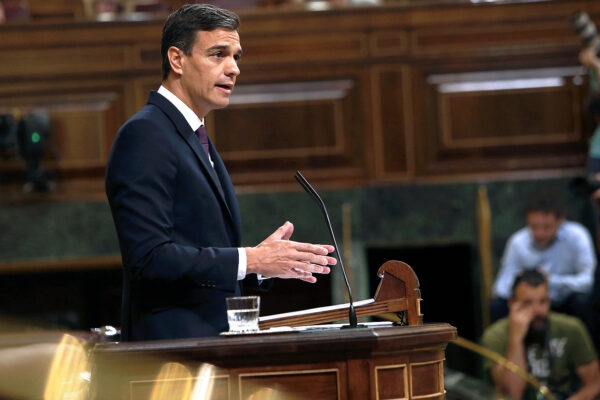
Demonstrations for Catalan independence have always have been peaceful — until Tuesday, when a sit-in outside the Spanish government delegation in Barcelona led to acts of vandalism and altercations with riot police.
While most separatists, who were protesting the long prison sentences given to their leaders by the Spanish Supreme Court, left around dinner time, some donned masks and threw bottles and firecrackers at police. Later in the evening, trash cans were set on fire and barricades erected on the Passeig de Gràcia, a luxury shopping street. It took until early Wednesday morning to clear the avenue.
The knee-jerk reaction from the Spanish right is to clamp down. Pablo Casado, the leader of the largest right-wing party in Congress, has called on Prime Minister Pedro Sánchez, a social democrat, to declare an emergency and take command of the Catalan regional police.
That is the worst thing he could do. Tensions are running high. The mossos (troopers) are at least seen as fellow Catalans by most protesters. Send in the National Police or the gendarmerie and the riots are bound to get worse.
Let Sánchez come to Barcelona instead, meet with members of the regional government and start listening to their demands; something he promised to do when he came to power a year ago, but still hasn’t.
This will be seen as weakness in other parts of Spain, where there isn’t a culture of compromise and consensus, but it will signal to Catalans that Madrid is finally taking them seriously.
Time for an alternative
I argue much the same in an op-ed for the Netherlands’ NRC newspaper this week: Spain has brought the Catalans nothing but misery in recent years, from spending cuts to beating up voters in the 2017 referendum to prison time for their leaders. Sánchez needs to give moderate Catalan nationalists a reason to believe there is still a future for them in Spain.
His predecessor, Mariano Rajoy, made the mistake of outsourcing the Catalan question to prosecutors and judges when a political solution is required.
Between 70 and 80 percent of Catalans want a vote on independence. Up to two-thirds want more autonomy. Nearly half want to break away from Spain — but that share falls to 35-40 percent when Catalans are given the option of becoming a federal state inside a reformed Spain.
That suggests there is still a third way: a new autonomy statute for Catalonia that gives the region more power, approved by Catalans in a referendum.
That way, secession is taken off the table, but the Catalans get to have their say.
Unconvincing
The latest line from Madrid is that the riots must stop before there can be talks.
But Catalans have pressed their demands peacefully. At the height of the economic crisis, their leaders asked the Spanish government for more control over the region’s finances in order to avoid cuts to a social security system the Catalans themselves pay for. They were refused. The regional government for years asked Spain to allow a legal referendum on independence. They were told this was impossible. Year after year, hundreds of thousands of Catalans turned out to demonstrate for self-determination without so much as a kerfuffle. In election after election did the separatists win a majority. And still the Spanish government would not give an inch.
The argument that the law doesn’t allow more autonomy or a legal independence referendum is also unconvincing. Laws can be changed. Indeed, it was as recently as 2006, when Catalonia got its current autonomy statute, and in 2010, when the Constitutional Court overturned parts of that statute in a lawsuit brought by the conservative party of Casado and Rajoy.
Foreseeable
I’m not writing this to justify violence. I live three blocks away from the Passeig de Gràcia. I would prefer to go to sleep tonight without the sound of police helicopters roaring overhead and the smell of burning trash bins in the air.
My point is that escalation was entirely foreseeable and wiser politicians would have worked to prevent it.
I warned two years ago that Rajoy’s refusal to even talk with the Catalans, much less meet any of their demands, was radicalizing the region. I warned a year ago that the longer the impasse lasted, the more the extremes would benefit.
They have. The Spanish center-right has adopted a hard line in a bid to outflank the far right, arguing that Catalan home rule must be suspended indefinitely. The two main Catalan independence organizations, who have professionally organized mass protests for years, and whose leaders were on Monday convicted to nine years in prison each, have lost control of the streets. Smaller, more radical groups now lead the protests.
Sánchez needs to show statesmanship and lead public opinion rather than be led by it. A hands-off approach didn’t work. Repression didn’t work. How about listening to the Catalans for a change and maybe even try to find a compromise?
